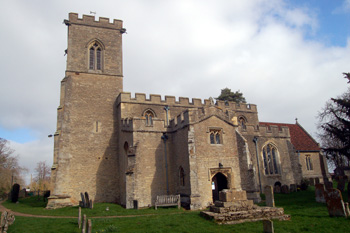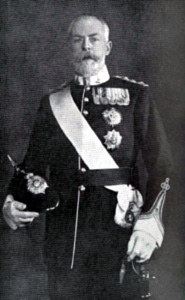![Oakley House about 1900 [Z50/85/4]](/CommunityHistories/Oakley/OakleyImages/Oakley House about 1900 [Z50-85-4]_349x233.jpg)
Oakley House about 1900 [Z50/85/4]
The Bedfordshire Times of 21st August 1942 carried an article entitled “Life at Oakley in the Nineties: Memories of a Ducal Estate” [CRT130Oakley6]. The text is reproduced below.
Recently, Mr. Edward Newell, of Oakley [who lived at Middle Farmhouse, was a baker and dairyman and post master from at least 1898 until at least 1924], who has completed fifty years as our correspondent, contributed an article to this newspaper on his early memories of Milton Ernest, his native village and his description of the times when it had many industries and businesses and was practically self-supporting. In the following article, with equally happy touch, he looks back upon Oakley when it formed part of the Estate of the Duke of Bedford, and later recalls a pleasant regime when the Duke’s agent, Mr. R. E. Prothero (afterwards Lord Ernle, Minister of Agriculture during the last war) lived at Oakley House, and who exercised such a wise and kindly influence on the village generally and was a great supporter of its sporting and social activities. Mr. Newell’s story begins: -
![Oakley House about 1930 [Z1130/85]](/CommunityHistories/Oakley/OakleyImages/Oakley House about 1930 [Z1130-85].jpg)
Oakley House about 1930 [Z1130/85]
In the eighteen-nineties the whole of Oakley belonged to His Grace Hastings, Duke of Bedford and the Marquess and Marchioness of Tavistock were in residence at Oakley House and Miss Rachel Gurney, who was staying at Oakley House, was a relative of Lady Tavistock and was later married to the Earl of Dudley. The Estate was well kept up. Mr. Charles Clarke, the head gardener, had a staff of seven gardeners, and of them Mr. William Beard is still living and is in his ninetieth year. Mr. Alfred White was the water bailiff and head gamekeeper and was assisted by his son and the under-keeper, Joseph Bird. Pheasants, partridge and wild duck were reared in large quantities and hares were in abundance. You could count more than a hundred hares in one field near Westfield Farm. Town Farm was farmed then by the Marquess and Mr. W. Cheatle was the farm manager, and the Marquess had a large enclosure on that farm for the rearing of game. The fencing was fox-proof and pheasants roamed the roads and scratched like so many chickens. There was hardly any traffic in the village, and there were not many anglers from the town to be seen at that period. The late Mr. Harry Thody, Mr. W. E. Taylor and Mr. T. S. Porter, and a few others, fished in the Oakley waters.

Oakley church from the south March 2011
A CHURCH REVIVAL
The Rev. C. J. E. Smith, of Bromham, was the Vicar, but there were small congregations at the church. The vicar played the harmonium: Mr. Samuel West was the parish clerk; Mr. H. V. Gostling and Mr. Robert Horrell were the churchwardens, but they only attended at the Easter vestry meetings, and the church continued in that state until years later, when the Marquess became the Duke and he only held the Dukedom for a brief period, and it then came to the late Duke Herbrand. He, with the Duchess, made a stay at Oakley House and saw the state of affairs, and he appointed and paid a curate, the Rev. T. A. Williams and a wonderful curate he was. He got a congregation together, a choir, bellringers etc. and his heart and soul were in the church. He was an excellent preacher, and on Sunday evenings in the summer the church was filled. He approached the Dowager Duchess Adeline on the matter of a Reading Room for the village, and by her influence the Duke had a Reading Room built in 1897 which proved a great boon to the village. The Rev. T. A. Williams was the president and the writer acted as secretary.
When Duke Herbrand succeeded to the Dukedom he appointed Mr. Walter Laurence as Chief Agent, an office he held for only a short time, as he was offered a Government position in India. He was succeeded by Mr. R. E. Prothero who came to Oakley House and from the very first took a keen interest in the village and the inhabitants. He had a bookcase fitted in the Reading Room and supplied the library. The Reading Room had hardly enough members to make it self-supporting, so we supplemented it with concerts, which were always well attended. We always provided a good programme and had some good artists from away, besides our local talent.
MUSIC AND CRICKET
The Bedford artists included the late Mr. William Paige Stuart, Mr. Charles Dunkley, Mr. Harry Stroud, Mr. F. Panchaud, Mr. Fred Lennard, the female impersonator, and many other well-known vocalists. The chairman at these concerts was the late Mr. William Hartop, and right well did he carry out his duties. A little later we started a dancing class. Mrs. Haulberg played the piano. We held a class each week and had a “long night” each month. These functions were a great success. We had a concert each month, so there was plenty of life and amusements in the village in those days.
The first summer Mr. Prothero came to Oakley, Arthur Hartop, E. Newell and a few others used to play cricket. When Mr. Prothero, who was a first-class cricketer*, suggested a village Cricket Club and one was started the following winter, he had a pitch laid out. That job was done by Dick Rogers the well known ModernSchool coach, and a beautiful pitch it was. The Curate at that time, the Rev. L. O. Fowler, was an excellent cricketer, and Reg Horrell, who was a fast bowler and a big hitter, Arthur Hartop, W. Perkins, I. Swain, J. Ruffhead, Joseph Hulatt, A. Tatman, F. Panter, A. Pepper, S. Quenby and J. Horne made a useful team. We played only friendly matches. Mr. Prothero was the president and also captain of the team, and I was the secretary. When the visiting teams came to Oakley they were entertained to tea on the field by Mr. Prothero, who after tea handed round cigars to the players and also the visitors who came to watch the game. Whit-Monday’s fixture was with Kempston, and we played our return match on Dr. Bower’s ground in September, when Dr. Bower kindly entertained us.

2nd Baron Ampthill as Colonel of the Bedfordshire & Hertfordshire Regiment
A GOOD MAN GOES
And so we carried on very happily until 1914 on that fateful day in August which finished off our cricket for so many members joined the Army. In 1918 the Duke of Bedford sold the Oakley Estate and we lost the best man Oakley has ever seen. Mr. Prothero wanted to buy the Estate, but the Duke wished to keep Oakley House in the family so, so Lord Ampthill bought Oakley House. Mr. Prothero, who by then had changed his name to Lord Ernle, bought an estate in Berkshire. The Reading Room was sold, and all the festivities in the village ceased. Lord Ernle, who was the Minister of Agriculture in the last war, did more for Oakley than any living man. The schoolchildren had a treat in the summer when he hired Manning’s roundabout, etc., for their amusement, besides giving them a good tea. At Christmas they had a similar feed and a Christmas tree and presents off it for all. The women of the village had their meat tea and a good concert each October. The Cricket Club had their supper at the close of each season, with roast beef, Yorkshire pudding, etc. His Lordship gave a bat each season for the best batting average, and a bat for the best bowler.
THE SCENE CHANGES
It was a sad blow to Lord Ernle when his son, Mr. Jack Prothero was killed the morning the Armistice was signed. His daughter Miss Hope Prothero was well known in the Oakley Hunt. She was a splendid rider and had some excellent horses. One in particular, “Cheriton Lass”, was much admired and a perfect fencer. But when the Oakley Estate was sold, bungalows and modern houses were erected, trees cut down, and a change came over the scene. Now there are only a few of the old Oakley people left. Rents have risen and the whole village has had a great many transformations. But we older ones like to look back on the past happy days.
* He played four times for Hampshire between 1875 and 1883 and twice for the Gentlemen of England, once each in 1872 and 1879. In these six matches he made 190 runs at an average, very impressive for the time, of 31.66. He made 110 in the second innings for the gentlemen of England against OxfordUniversity in June 1879. He also bowled medium pace and took ten first class wickets at the, quite high for the time, average of 18.10.